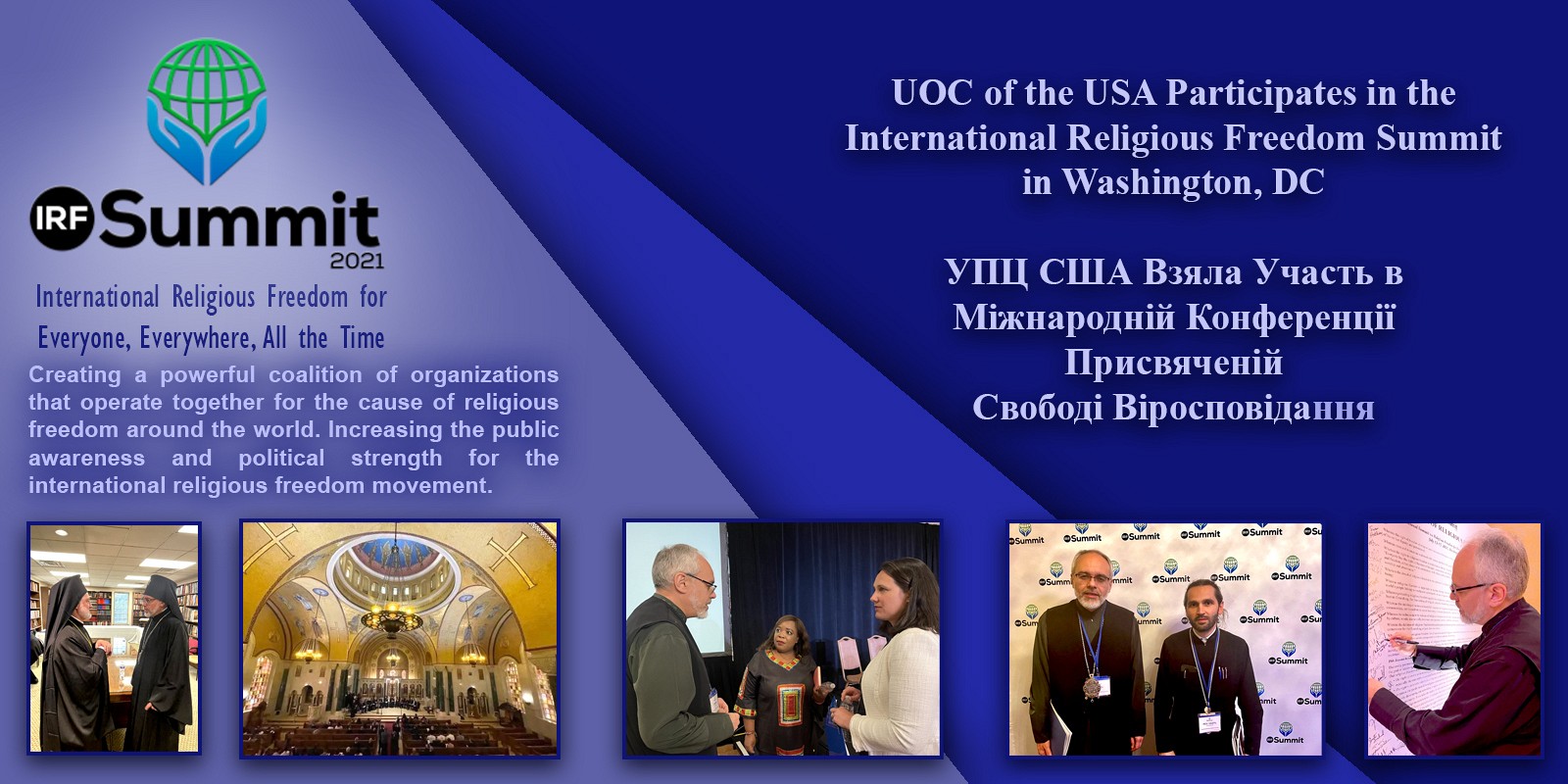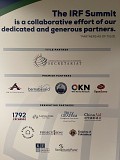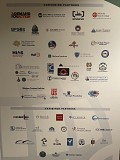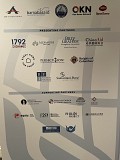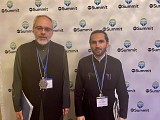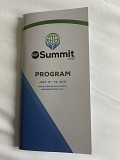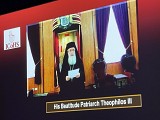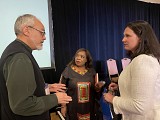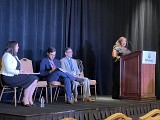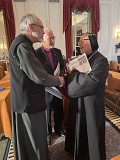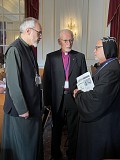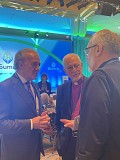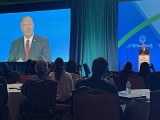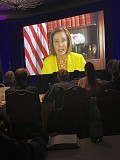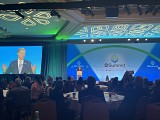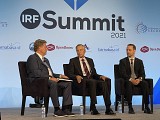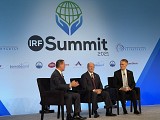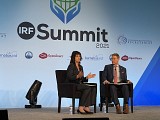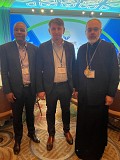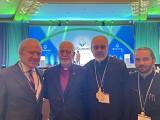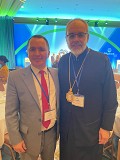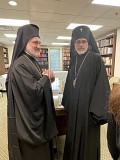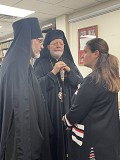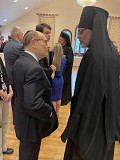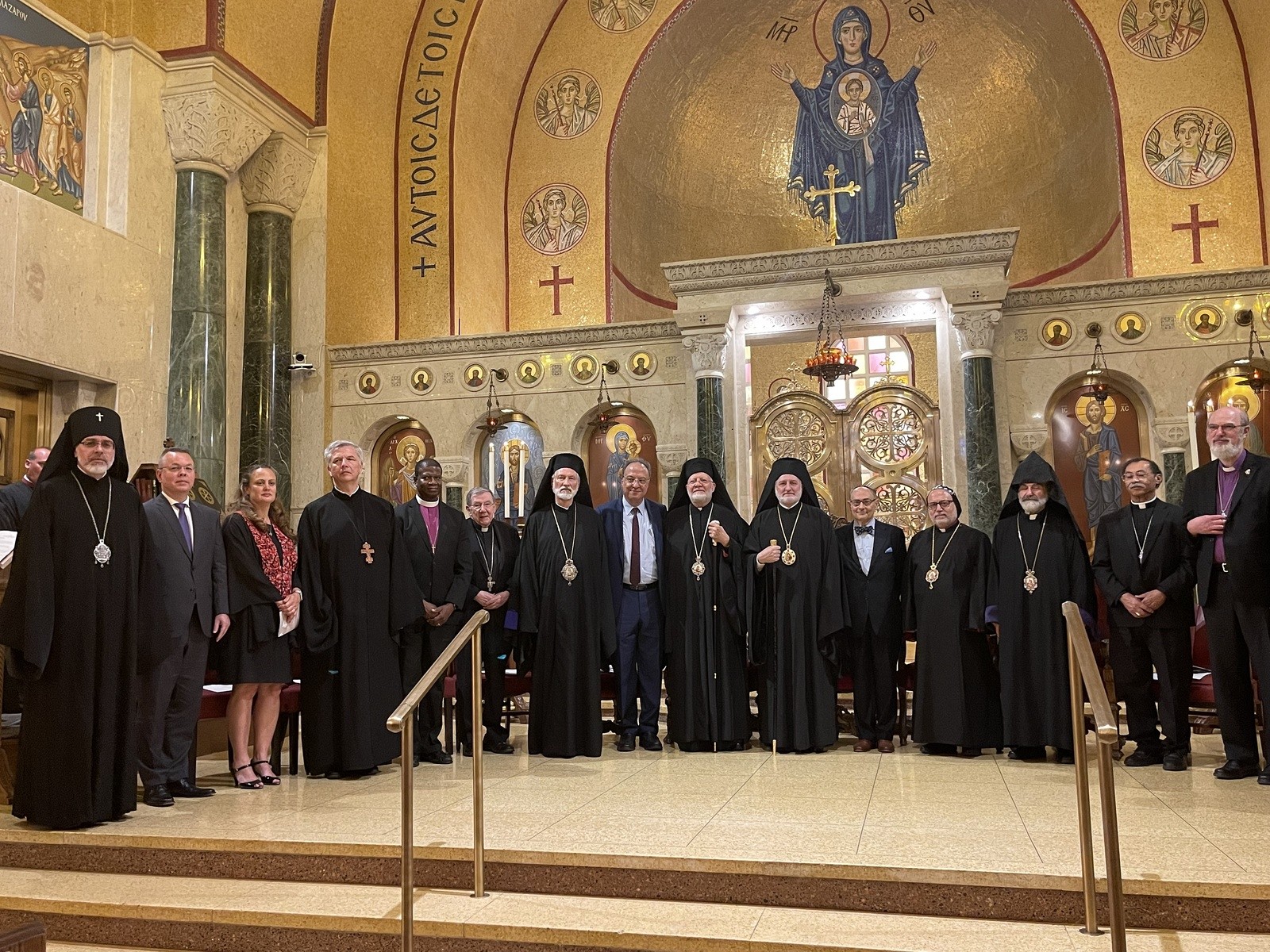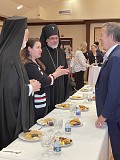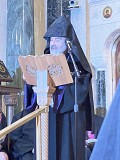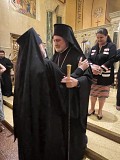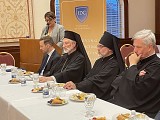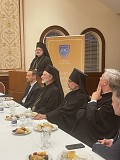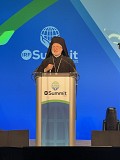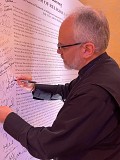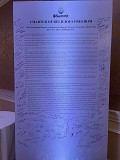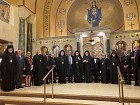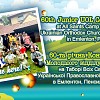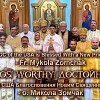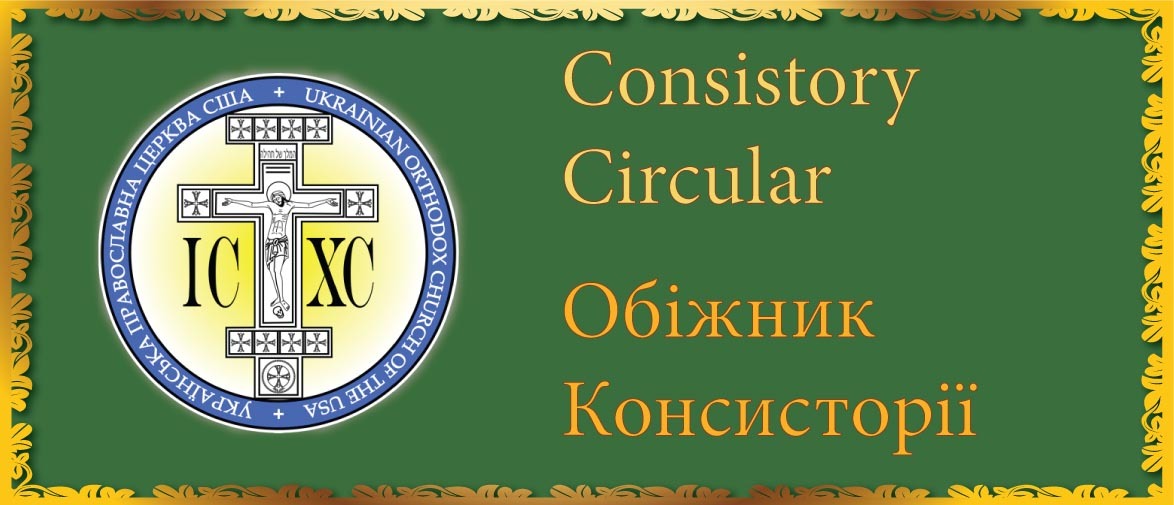The Ukrainian Orthodox Church of the USA took part in the three-day International Religious Freedom Summit in Washington, D.C. on 12-15 July, 2021. Under the theme “Religious Freedom for Everyone, Everywhere, All the Time”, the Summit was this year’s largest civil society-led conference on international religious freedom in the world. Its aim was to unite key participants to create a powerful coalition of organizations that operate together for the cause of religious freedom and increase the awareness and political strength of the international religious freedom movement.
His Eminence Archbishop Daniel, accompanied by Rev. Fr. Vasyl Pasakas - Dean of Students of St. Sophia Ukrainian Orthodox Theological Seminary represented the UOC of the USA at the Summit.
Roughly 80 percent of the world’s inhabitants live in countries where there are high levels of governmental or societal restrictions on religion. Bringing attention to the plight of people of faith who are persecuted, whether individually or collectively, the Summit is aiming at growing the grassroots and global movement for religious freedom.
The International Religious Freedom Summit was hosted by former U.S. Ambassador at Large for International Religious Freedom, Sam Brownback, and former Chair of the U.S. Commission on International Religious Freedom (USCIRF), Katrina Lantos Swett.
The Summit gathering brought together individuals from over 30 faith traditions and increase the “public awareness and political strength for the international religious freedom movement.”
Among the notable speakers that provided remarks and special messages were the Patriarch of Jerusalem, House Speaker Nancy Pelosi, D-Calif., former Secretary of State Mike Pompeo, USAID Administrator Samantha Power, White House Faith-Based and Neighborhood Partnerships Executive Director Melissa Rogers, and USAID faith-based office director Adam Phillips.
Other speakers included Pakistani Christian mother Asia Bibi, who spent nearly a decade on death row for blasphemy in Pakistan; Mariam Ibraheem, a Sudanese Christian sentenced to death for apostasy in Sudan; civil rights activist Chen Guangcheng, who was placed under house arrest in China for his activism; and Christian Boko Haram survivor Joy Bishara.
“Once again, the energy around religious freedom has far exceeded our expectations,” said Ambassador Brownback. “This freedom is a fundamental, universal human right that is essential to personal and societal flourishing. We’re amazed and humbled by the incredible commitment of people from all over the world who will join us — many of whom are risking their lives by doing so — to advocate for religious freedom for everyone, everywhere, all the time.”
In his reflection, Archbishop Daniel stated that “…persecution against people of faith around the world must end. For too long, many governments have violated the fundamental rights of people of faith by allowing impunity for egregious crimes committed against religious minorities, and in particular against Christians. The International Religious Freedom Summit aims to unite international efforts to promote religious freedom worldwide.”
Ambassador Brownback in one of his addresses to the Summit attendees stated, “It’s better for a Muslim to stand up for religious freedom in the Middle East, where they are in the majority… We need Christians standing up in places where they’re a majority and Jewish people to stand up for religious freedom where they’re in a majority.”
Speaking to the representatives of the Oriental Orthodox Churches, Vladyka Daniel reflected that the aim of the Summit is to provide insights on international religious freedom and address violations against religious liberty while providing a support group for those who are being persecuted for their faith. Religious persecution is on the rise in many countries: according to a Pew Forum on Religion & Public Life, 83 percent of the world’s approximately 7 billion people now live in countries with high government or social hostilities involving religion and persecution.
On Wednesday, July 15, 2021, Archbishop Daniel took part in the annual “In Defense of Christians Ecumenical Prayer Service” co-hosted by “In Defense of Christians” (IDC), the nation’s leading advocacy organization for Christians and religious minorities in the Middle East and Africa, and the Greek Orthodox Archdiocese of America at Saint Sophia Greek Orthodox Cathedral in Washington, DC.
The service fell on the one-year anniversary of the reconversion of the Hagia Sophia into a mosque, and offered solemn commemoration. Various Christian traditions were represented at the Ecumenical Prayer Service, with prayers offered by the following members of the clergy: His Eminence Archbishop Elpidophoros of America, the Greek Orthodox Archdiocese of America; Archbishop Vicken Aykazian, Ecumenical Director and Diocesan Legate of the Eastern Diocese of the Armenian Church of America; Metropolitan Joseph of the Antiochian Orthodox Christian Archdiocese of North America; Mor Dionysius John Kawak, Archbishop and Patriarchal Vicar of the Syriac Orthodox Archdiocese of the Eastern United States; Archbishop Anoushavan Tanielian, Prelate of the Eastern Prelacy of the Armenian Apostolic Church; Archbishop Thomas Schirrmacher, Secretary General of the World Evangelical Alliance; Bishop Irinej Dobrijević of the Serbian Orthodox Diocese of Eastern America; Bishop Denis Madden, Bishops’ Committee for Ecumenical and Interreligious Affairs, USCCB; Bishop Gregory Mansour, Bishop of the Maronite Catholic Eparchy of Saint Maron of Brooklyn; The Right Rev. Eugene T. Sutton, Bishop of the Episcopal Diocese of Maryland; Bishop Elias Zaidan of the Maronite Catholic Eparchy of Our Lady of Lebanon of Los Angeles; Bishop Roy Campbell of the Catholic Archdiocese of Washington, DC; Rev. Dr. Mae Elise Cannon, Executive Director of Churches for Middle East Peace;Pastor Dr. Bob Roberts Jr., Founder of Northwood Church, GlocalNet & Multi-Faith Neighbors Network; Pastor Andrew Brunson, Author of God’s Hostage.
Additionally, distinguished guests listened to remarks offered by: Hungarian State Secretary for the Aid of Persecuted Christians, Tristan Azbej; Regional Coordinator & Liaison for Equity for Diverse Communities in MENA at USAID, Dr. Rita Stephan; USCIRF Chair, Nadine Maezna. Keynote addresses were offered by IRF Summit co-chairs, President of the Lantos Foundation for Human Rights Dr. Katrina Lantos Swett, and Ambassador Samuel Brownback.
“My great appreciation goes to the efforts of IDC for the protection of persecuted Christians and for all the accomplishments you have undertaken over the years,” said Tristan Azbej.
Rita Stephan reaffirmed USAID’s dedication to promoting international religious freedom by stating “We are committed to working together to continue the recovery and the healing of affected communities. But we also want to take it a step further. No religious or ethnic minority will be safe anywhere unless we proactively work together to promote tolerance.”
Nadine Maenza emphasized IDC’s mission and event by stating that “It is only through this model of prayer and action that we are going to attack the idea of stopping religious persecution.”
Katrina Lantos Swett made a powerful statement regarding the reconversion of the Hagia Sophia into a mosque, noting that “we honor and revere mosques, but we do not honor and revere the theft of one faith by another. The trampling of one sacred place by another community–that is not right.
Samuel Brownback concluded the evening’s events by emphasizing the perseverance of the Orthodox community. “I appreciate your standing firm in the face of lots of different challenges, many of which most people would have given up on a long time ago.”
His Eminence Archbishop Elpidophoros, addressing the Summit on behalf of the Orthodox Church, stated: “It is a great privilege to be with you today, and I want to express the appreciation of the Ecumenical Patriarchate of Constantinople, the Mother Church of Eastern Christianity – for the exceptional work of the International Religious Freedom Summits. The partner and supporting entities bear witness to the inclusive and the comprehensive nature of the vision for human liberty and freedom of conscience we seek to enhance around the globe.
I shall commence the subject of my remarks, with the following observation. “Religious Nationalism” is only one side of the coin. There is also “Nationalistic Religion.”
Much like the terms “Caesaropapism” and “Papocaesarism,” that described the tensions between political and ecclesial autocracies of centuries past, the interests of the State and those who desire some form of “theocracy” are seldom aligned.
The shoreline where these rising tides appear is a very long one, with diverse landscapes. Here in the United States, we have witnessed – especially in recent years – how independent religious bodies with charismatic leaders are using the public, political sphere to advance their own agendas. This is a clear case of “Nationalistic Religion,” where identity politics are incorporated into a religious entity in order to advance a religious agenda. Should such a tide rise to an undue influence – either in the legislative, judicial, or executive branches of government, it would challenge the very idea of the First Amendment, and the non-establishment clause concerning religion.
On the other hand, we could look at some aspects of modern Iran, and find a distinct brand of “Religious Nationalism,” a full-blown attempt at theocracy by a seeming majority. But to see a spiritual basis for the State is to create a stratification of society along religious lines, a spiritual apartheid, if you will. The result is a monolithic society unyielding to diversity…
Finally, there is a hybrid of the two, as in the case of the Russian Federation and the post-Soviet Russian Orthodox Church. The painful history of the Church under the communist regime came to a sudden and stunning halt with the fall of the Iron Curtain.
However, even as the Russian Federation morphed into its present form, the newly freed Russian Orthodox Church struggled to rebuild its place in society. Its cooperation and support of the State has been a way to regain its former glories. Yet, it is the state itself that has benefited from the “Religious Nationalism” created by the reborn Orthodox Church within its borders. Precisely because the Moscow Patriarchate maintains much of the contours of the old Soviet Union. The close relationship between the state Foreign Ministry and the Church Department of External Relations is well known.
Through the networks of the Moscow Patriarchate, the Russian Federation is able to exert influence in the new nation-states that emerged after the fall of the Iron Curtain. Ukraine is a case in point, where a local Orthodox Church was established, legally and canonically, by the Ecumenical Patriarchate, yet the Moscow Patriarchate continues to maintain its own entity. This is clearly in the interests of the Russian Federation which benefits as much, if not more, from its “Religious Nationalism” as the Church does from its “Nationalistic Religion.”
These few examples – painted in broad strokes – highlight the kinds of exigencies that we are facing. By promoting one religion above others, states create an oversized monolith in the public square that de facto (and sometimes de jure) excludes the citizenry who do not conform to that religious point of view.
For the religious entity, the material advantages of state-sponsorship should be far-outweighed by the cost to the ethical, moral, and spiritual core of the faith tradition – any faith tradition. To put it in specifically Christian terms: “For what shall it profit a man, if he shall gain the whole world, and lose his own soul.” Throughout history, every religious body has had to face the choice of ‘rendering unto Caesar the things that are Caesar’s, and unto God the things that are God’s.’
So how do we overcome these tides that seem to inexorably rise over time?
First, we must confess that such monoliths are not consistent with a modern, pluralistic, and emergent world. Democracy still finds a way in the imagination of peoples who yearn for liberty. That is why the cultivation of indigenous democratic forms of government – not the imposition from without – is an answer for both the state and the religious culture. Because even a homogenous religious culture is dependent on the individual’s freedom, in order for faith to be genuine and not coercive.
Second, we can accept that the historical journeys of any people possess complex and complicated markers that, if respected, create seawalls that hold back the troubling and troublesome tides. Allow me to close with a recent and very relevant example from the nation of my birth.
Last year, in this very month of July, the most iconic edifice of Orthodox Christianity – the Hagia Sophia in modern Istanbul, had its status withdrawn and was re-converted into a mosque. This Church was the largest Church in the world in the first millennium of Christianity. The end of the Roman Empire in 1453 changed its use, as has happened throughout history to many religious edifices.
But when the Turkish state emerged a century ago, it was deemed that such a unique and potent symbol should emanate an inclusive message, one that served the interests of all the citizens. Thus, the Hagia Sophia became a museum. For the Orthodox Christian world, this was not the best solution, but it was a vision for a future that included the incredible historical journey of Anatolia, not just one phase of that journey. We see in this re-conversion how the tide rose. And we see in those that called this crisis out, the effort to stem the tide.
My fellow laborers in the field of human freedom and inclusivity, I have outlined only some of the shores against which the tides of “ Religious Nationalism” and “Nationalistic Religion” are crashing. Our best seawalls are going to be built out of cooperative efforts to instill democracy and freedom of conscience around the globe. This Summit is a most significant building block in that wall, and I thank you for your attention today and for your service to this mission.”
The participants of the Summit released and signed "A Charter of Religious Freedom" declaring that "every government, every religious community, and every political and civil society organization in the world should strive toward the goal of achieving freedom of religion and conscience, for everyone, everywhere — protected by law and valued by culture." His Eminence Archbishop Daniel signed the Charter on behalf of the Ukrainian Orthodox Church of the USA.
For Ukrainian Language Version of the article, please visit the following link.
|
| |||||||||||||
